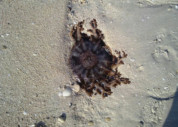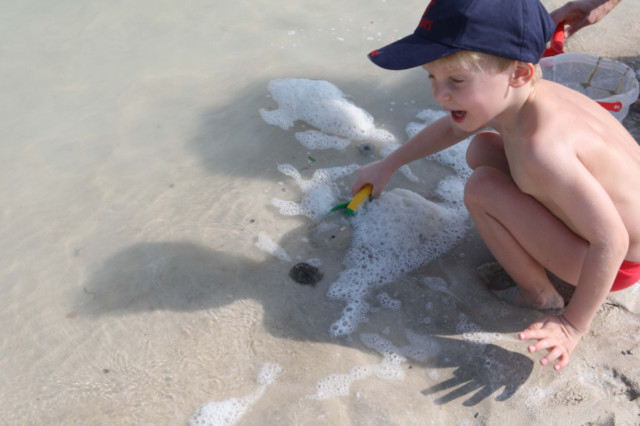
Dubai: Hundreds of jellyfish have washed ashore in Al Mamzar, sparking fear among beachgoers.
As hordes of the gelatinous creature swarmed the coastline of the popular leisure destination, bathers and swimmers said they would rather play in the sand than in the surf.
“We are not going anywhere near the water. It’s scary out there,” said Russian tourist Mark Yershov, 44, visiting the beach with his wife and two sons ages 12 and seven. A Syrian woman said she didn’t let her 10-year-old daughter venture near the beach, fearing she may stumble on a jellyfish and get stung.
But some children appeared unperturbed, scooping the marine animals from the water with their tiny beach shovels without fear. An Indian man said he had been visiting Al Mamzar Beach for four years but had never come across so many jellyfish.
“Last week I counted 20, mostly dead, on one stretch alone. Some were as big as a saucer,” he said.
harmless
However, Major Ali Saqr Sultan Al Suwaidi, President of the Dubai-based Emirates Marine Environmental Group, (EMEG) said beachgoers need not be alarmed.
“This is Cassiopea, commonly known as Upside-Down jellyfish. They are pretty rare, but they are certainly not harmful,” he said, identifying the species from an image XPRESS showed him.
Arabella Willing, in-house biologist at Park-Hyatt Abu Dhabi, also held the same view.
“These look like Upside-Down jellyfish which are typically found in muddy waters and get their name because they often live upside down on the bottom; the red colour comes from symbiotic algae that live inside their body. They have only a mild sting and are not considered especially dangerous,” she said.
Mohammad Abdul Rahman Hassan, Head of the Marine Environment and Sanctuaries Unit, Dubai Municipality, said he had not come across reports of a jellyfish influx, but urged residents to be cautious.
“Most varieties of jellyfish are not dangerous, but some of them could be harmful and their sting could require medical attention. It’s better to keep away from them. Sea creatures are part of nature and often come to the beach, driven by high waves or looking for food,” he said.
According to the National Science Foundation, every year around 150 million people are exposed to jellyfish worldwide. Most stings are minor, but rare tentacle swipes from some types can inject life-threatening doses of poison.













